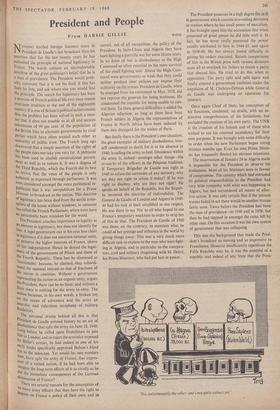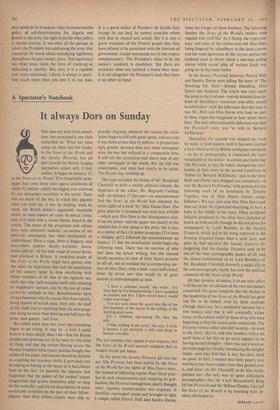President and People
From DARSIE GILLIE PARIS N°THING startled foreign listeners more in President de Gaulle's last broadcast than his assertion that for the last twenty years he has embodied the principle of national legitimacy in France. The words contain an uncomfortable overdose of the great politician's belief that he is a man of providence. The President would prob- ably comment that it is not his fault if this has been his fate, and ask where else you would find the principle. The search for legitimacy has been a neurosis of French political life ever since reason overcame tradition at the end of the eighteenth century. It is one of Britain's political achievements that the problem has been solved in such a man- ner that it does not trouble us at all and secures submission of 99 per cent. of the population of the British Isles to alternate governments by rival Parties which have often treated each other as unworthy of public trust. The French long ago discovered that a simple assertion of the rights of the people does not take you very far. A plebiscite has been used to abolish constitutional govern- ment as well as to restore it. It was a dogma of the Third Republic, which the Fourth did its best to revive, that the voice of the people is only authentic as expressed through parliament. It was even considered amongst the more puritanical re- Publicans that it was unrepublican for a Prime Minister to broadcast to the nation. This doctrine of legitimacy has twice died from the sterile atmo- sphere of the house without windows, as someone has called the French Parliament, where trees have 80 persistently been mistaken for the wood. The President attaches importance to legality as an element in legitimacy, but does not identify the two• A legal government can in his eyes lose claim to legitimacy if it does not maintain national unity, or preserve the higher interests of France, above all her independence. Hence he denied the legiti- lhaeY of the governments of Main and those of the Fourth Republic. These last he dismissed as Tractionalise because, he claimed, they subordi- nated the national interest to that of fractions of the nation in coalition. Without a government representing the nation as an organic unity, argues the President, there can be no State; and without a State there is nothing for the army to obey. The nation becomes, in his own words, a broken toy °II the ocean of adventure and the army an anarchic and ridiculous scrapheap •of military feudalities. president personal drama behind all this is that de Gaulle entered history by an act of disobedience that split the army on June 18, 1940. kt".°11C before he called upon Frenchmen to join in London and to reject the armistice imposed oY Hitler's armies, he had indeed in one of his early books specifically approved Nelson's blind early to the telescope. Yet would he, one wonders 11.°w, have split the army of France, that expres- sion of a united nation, if he had been able to ITagine the long-term effects of it as vividly as he did the immediate consequences of the German domination of France? There are several reasons for the assumption of !t) many army officers that they have the right to Impose on France a policy of their own, and to correct, out of all recognition, the policy of the President. In Indo-China and Algeria they have been fighting a guerrilla war for some fifteen years. In no form of war is disobedience to the High Command so often essential to the mere survival of the small fighting unit. Above the High Com- mand were governments so weak that they could neither produce clear policies nor impose their authority on the armies. President de Gaulle, when he emerged from his retirement in May, 1958, did not reprove the generals for being mutinous. He condemned the republic for being unable to con- trol them. To these general difficulties is added the Algerian infection; as long as there have been French settlers in Algeria the representatives of France in North Africa have been seduced by them into disregard for the wishes of Paris. But finally there is the President's own situation; the great exemplar of military disobedience, him- self condemned to death for it in his absence in 1940, is calling the army to heel. Dissidence within the army is, indeed—amongst other things—the revanche of the officers in the Pdtainist tradition. If Temporary Brigadier de Gaulle was right in 1940 to refuse the surrender of any territory, why are they not right to refuse it today? If he was right to disobey, why are they not right? He speaks on behalf of the Republic, but the Repub- lic invented the doctrine of indivisibility. The General de Gaulle of London and Algiers in 1940- 44 had his task at least simplified in one respect. He was there to say 'No' to all who hoped to use France's temporary weakness in order to strip her of this or that. The President de Gaulle of 1960 was there, on the contrary, to maintain what he could of her prestige and influence in the world by giving things away. This was a very much more difficult task to explain to the men who were fight- ing in Algeria, and in particular to the conspira- tors, civil and military (beginning with M. Debre, his Prime Minister), who had put him in power. The President possesses in a high degree the skill in government which consists in avoiding decisions in matters where he has small power of execution. It has brought upon him the accusation that when possessed of great power he did little with it. In fact, he has never really possessed the power usually attributed to him in 1944-45, and again in 1958-60. He has always found difficulty in getting his orders executed. Recent comparisons of him in the British press with various dictators seem all to overlook his failure to create a party that obeyed him. He tried to do this when in opposition. The party split and split again and finally entered a government coalition under the impulsion of M. Chabran-Delmas while General de Gaulle was undergoing an operation for cataract. Once again Chief of State, his conception of his functions, combined, no doubt, with an in- stinctive comprehension of his limitations, has excluded the creation of his own party. The UNR is the creation of his friends and of those who wished to use his renewed ascendancy for their own purposes. It was brought with some difficulty to order when the new Parliament began sitting thirteen months ago. Even his own Prime Minis- ter has frequently flouted his obvious intentions. The insurrection of January 24 in Algeria made it impossible for the President to observe his limitations. Most of his Ministers were in favour of compromise. The country which had entrusted its political responsibilities to the President had very little sympathy with what was happening in Algiers, but had surrendered all means of effec- tive action. It was only certain that if the present trustee failed to act there would be another trustee fairly soon. Twice before the President had been the man of providence—in 1940 and in 1958; but then he had stepped in amongst the ruins left by other men. On this occasion it was his own system of government that was collapsing. This was the background that made the Presi- dent's broadcast so moving and so impressive to Frenchmen. However insufficiently republican the Fifth Republic may be, it was the essential of a republic and indeed of any State that the Presi-
`No, unfortunately the other one's not quite extinct yet.'
dent saved in his broadcast when he reasserted his policy of self-determination for Algeria and denied to the army the right to decide what policy it should exercise. It was after all the passage in which the President was addressing the army that contained the words about embodying legitimacy throughout the past twenty years. That legitimacy has three times taken the form of restoring or defending a republic. But, alas, it is a republic ever more attenuated. Liberty is always in peril: how much more when you owe it to one man. It is a grave defect of President de Gaulle that, though he can lead, he cannot associate others with him in council and action. But it is also a grave weakness of the French people that they have refused to be associated with the function of government. Leader and people are in this respect complementary. The President's claim to be the nation's yardstick is exorbitant. But there are occasions when any yardsick is better than none. It is not altogether the President's fault that there is no other to hand.







































 Previous page
Previous page